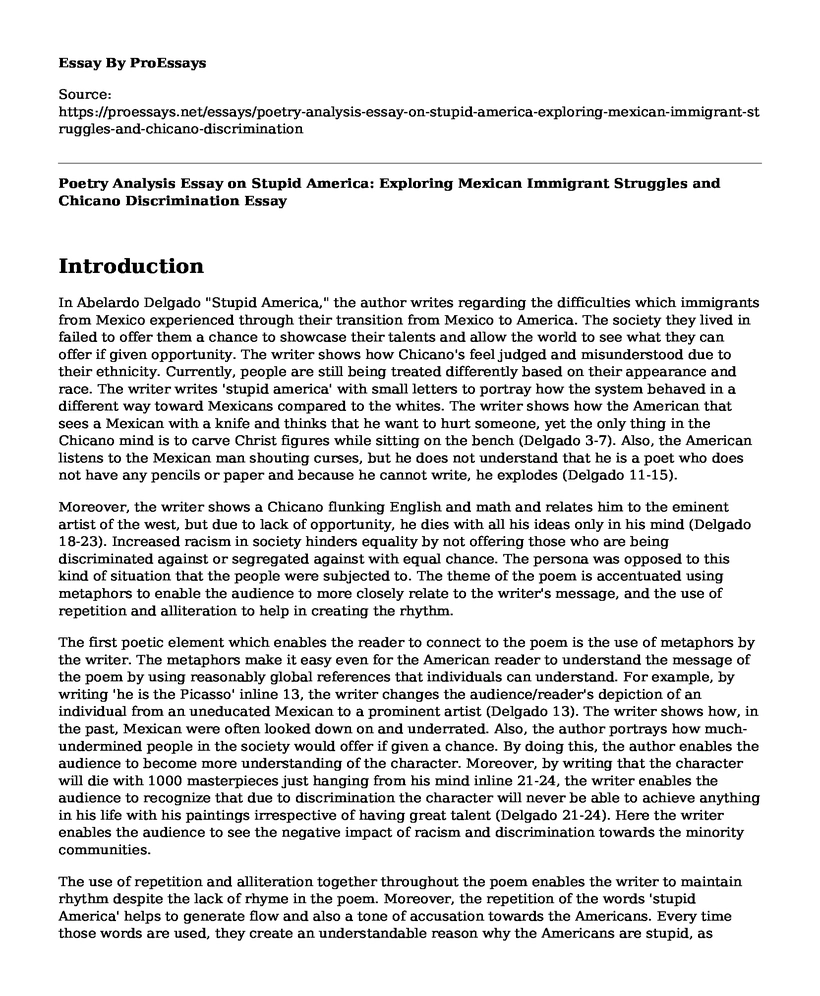Introduction
In Abelardo Delgado "Stupid America," the author writes regarding the difficulties which immigrants from Mexico experienced through their transition from Mexico to America. The society they lived in failed to offer them a chance to showcase their talents and allow the world to see what they can offer if given opportunity. The writer shows how Chicano's feel judged and misunderstood due to their ethnicity. Currently, people are still being treated differently based on their appearance and race. The writer writes 'stupid america' with small letters to portray how the system behaved in a different way toward Mexicans compared to the whites. The writer shows how the American that sees a Mexican with a knife and thinks that he want to hurt someone, yet the only thing in the Chicano mind is to carve Christ figures while sitting on the bench (Delgado 3-7). Also, the American listens to the Mexican man shouting curses, but he does not understand that he is a poet who does not have any pencils or paper and because he cannot write, he explodes (Delgado 11-15).
Moreover, the writer shows a Chicano flunking English and math and relates him to the eminent artist of the west, but due to lack of opportunity, he dies with all his ideas only in his mind (Delgado 18-23). Increased racism in society hinders equality by not offering those who are being discriminated against or segregated against with equal chance. The persona was opposed to this kind of situation that the people were subjected to. The theme of the poem is accentuated using metaphors to enable the audience to more closely relate to the writer's message, and the use of repetition and alliteration to help in creating the rhythm.
The first poetic element which enables the reader to connect to the poem is the use of metaphors by the writer. The metaphors make it easy even for the American reader to understand the message of the poem by using reasonably global references that individuals can understand. For example, by writing 'he is the Picasso' inline 13, the writer changes the audience/reader's depiction of an individual from an uneducated Mexican to a prominent artist (Delgado 13). The writer shows how, in the past, Mexican were often looked down on and underrated. Also, the author portrays how much-undermined people in the society would offer if given a chance. By doing this, the author enables the audience to become more understanding of the character. Moreover, by writing that the character will die with 1000 masterpieces just hanging from his mind inline 21-24, the writer enables the audience to recognize that due to discrimination the character will never be able to achieve anything in his life with his paintings irrespective of having great talent (Delgado 21-24). Here the writer enables the audience to see the negative impact of racism and discrimination towards the minority communities.
The use of repetition and alliteration together throughout the poem enables the writer to maintain rhythm despite the lack of rhyme in the poem. Moreover, the repetition of the words 'stupid America' helps to generate flow and also a tone of accusation towards the Americans. Every time those words are used, they create an understandable reason why the Americans are stupid, as described by the author. In line seven of this poem, the alliteration of letter 'c' and 'carve Christ figures,' helps to develop accusation sound that is hard (Delgado 7). The use of 'he is a poet that does not have a pencil and paper' in lines 12 and 13 creates an angry inclination with the use of letter 'p' (Delgado 12-13). It shows how the character felt bad at Americans because of looking down on him when he is living in an unfriendly environment that does not provide him opportunities.
Conclusion
In this poem, the author showed the struggles which Mexicans had to endure when they relocated to the U.S before experiencing happiness. The theme of this poem remains relevant to current society because the rate of inequality in the U.S is still high. Racism and discrimination continue to happen, and it hurts many people, particularly the minority communities, who feel that they are the target. Moreover, this poem is important to read because the writer helps to portray that even if racism does not lead to ongoing violence all the time, it profoundly affects individuals' lives negatively by denying them equal opportunities (Delgado 21-24). Also, the poem helps the readers to understand better how the world they are living operates. The reader can recognize the importance of promoting social justice and equality in the society to provide all people with equal opportunities. The poem enables the reader to understand that some people are living a desperate life, not because they are lazy or uneducated, but because they are not offered equal opportunities (Delgado 19). Thus, the poem teaches the reader not to judge people, and to become advocates of urging the policymakers to create programs/laws that will help to implement access to equal opportunities in the society.
Works Cited
Delgado, Abelardo L., and Abelardo. Here Lies Lalo: The Collected Poems of Abelardo Delgado. 2014.
Cite this page
Poetry Analysis Essay on Stupid America: Exploring Mexican Immigrant Struggles and Chicano Discrimination. (2023, Mar 04). Retrieved from https://proessays.net/essays/poetry-analysis-essay-on-stupid-america-exploring-mexican-immigrant-struggles-and-chicano-discrimination
If you are the original author of this essay and no longer wish to have it published on the ProEssays website, please click below to request its removal:
- A Literary Essay Sample: Allusions in Hamlet
- "The Yellow Wallpaper": Suppression of Women in 19th Century and Escape
- Essay on Frankenstein by Mary Shelley
- Major Roles of Settings in Worn Path and The Thing They Carried
- Poetry Analysis Essay on "Let America Be America Again"
- Annotated Bibliography Example on The Hunger Games
- Essay on Everyday Use and Glass Menagerie: Family Struggles and Complexities







